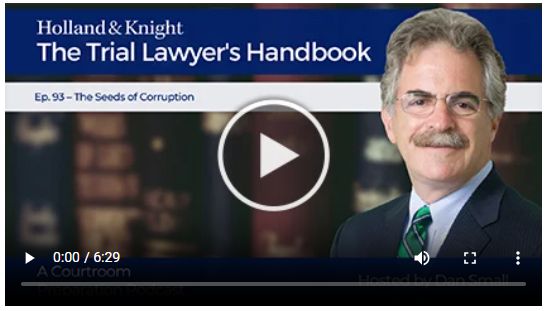- within Criminal Law topic(s)
- in United States
- within Criminal Law topic(s)
- in United States
- within Criminal Law topic(s)
The Trial Lawyer's Handbook: A Courtroom Preparation Podcast Series
In this episode of "The Trial Lawyer's Handbook," litigation attorney Dan Small begins a multi-part examination of a drug trafficking and corruption case in Appling County, Georgia. As increased law enforcement efforts in Florida pushed drug smuggling operations into Georgia, local law enforcement officers, including both a former and a sitting sheriff, became involved in facilitating drug shipments. Mr. Small explains how financial incentives and personal relationships contributed to the involvement of officers in criminal activity. He describes the investigation, the use of grand jury subpoenas and the challenges faced in confronting corruption within law enforcement. The episode highlights the realities of prosecuting these cases and the importance of maintaining accountability in the justice system.
Listen to more episodes of The Trial Lawyer's Handbook here.
This podcast episode was adapted from Mr. Small's book Lessons Learned from a Life on Trial: Landmark Cases from a Veteran Litigator and What They Can Teach Trial Lawyers.
Podcast Transcript
Daniel Small: In this episode of the podcast, we switch from the deadly grain elevator explosion case we've been talking about to corruption and drugs. In the early days of the war on drugs, Florida was the focus, which made good sense. It has 1,350 miles of coastline, close proximity to the Caribbean and Central and South America. So it was a natural entry point. Law enforcement agencies of all shapes and sizes — local, county, state and federal — all got money to try to cut off the supply of drugs coming into the United States through Florida.
Alas, the basic laws of supply and demand came into play. Those laws say that if you limit supply without cutting off demand, two things happen. First, the price will go up. Second, the market will seek other sources of supply. In the drug industry, both of those things happened. The price — and thus the potential profits for smugglers — went up dramatically. So smugglers looked for other locations that didn't have Florida's law enforcement pressure. One of those was right next door in Georgia.
Appling County is a small rural county in southeast Georgia, founded in 1818 and named after Lieutenant Colonel Daniel Appling, a soldier in the War of 1812. It is 512 square miles of mostly woods and farmland. The 1990 census figures gave it a population of about 15,000 with a low average income. So drug profits were attractive. It was the perfect out-of-the-way place.
In the southern part of that county, well away from the county seat of Baxley, was the largest dairy farm in Georgia. Two local men, Larry Jackson and Lemuel Morris, built an airstrip on the farm and started bringing in plane loads of drugs. They were careful, often receiving shipments on Friday nights. Why? Because on Friday nights, everyone else was way up in Baxley for the high school football game. They'd even talk about the different loads by using the name of the opposing team playing that particular night. "Oh yeah, that was the Reedsville load." They had a good thing going
Corruption, of course, was a frequent companion to the drug trade. It was a simple equation. People in the drug business wanted protection from arrest, from competitors and other interference. Meanwhile, the business itself brought in more cash than someone on a government law enforcement salary could imagine. So inevitably, willing buyers found willing sellers.
But it could be complicated. In Florida, there were many overlapping jurisdictions. If you bribed a city cop to protect your drug business, the county, the state or the federal agencies might still be all over you. On the other hand, in south Georgia at the time, it was simpler. The county sheriff was a single powerful figure who controlled most law enforcement in the county.
In a county as small as Appling County, Jackson and Morris had grown up with the sheriff and his deputies, so reaching out to them was easy. They recruited and bribed the former sheriff, Red Carter, and the current sheriff, Joe Lightsey. It was surprisingly easy and seemingly safe. After all, they were the law in that little county. Who could challenge them? It was too easy.
In one tape recording — more on that later — one of the deputy sheriffs tells Larry Jackson that he's worried about the pending government investigation. As a prosecutor with the Organized Crime Strike Force of the United States Department of Justice in Washington, I was working with the Savannah, Georgia, U.S. Attorney's Office to begin a grand jury investigation. Our subpoenas got a lot of attention in Appling County. To reassure the deputy sheriff, Jackson asked him what was his annual salary as a deputy, and then laughingly compares it to what the deputy made in the last six months, just sitting around on Friday evenings, keeping an eye out. Both numbers were absurd. His deputy sheriff pay was offensively low, and his cut for one evening, one evening of protecting a plain load of drugs that he never actually saw, was irresistibly high.
When we eventually confronted one of the deputies and somehow convinced him to plead guilty and cooperate, he said he felt terrible about what he had done. But he was confused about how someone was supposed to put their life on the line as a cop and also support a family on such an absurdly low salary when low-lifes were making more money in one night. They are not easy arguments to counter. And were common throughout the war on drugs. We had to demonstrate that there were other consequences.
So stay tuned for the next episode.
The content of this article is intended to provide a general guide to the subject matter. Specialist advice should be sought about your specific circumstances.


